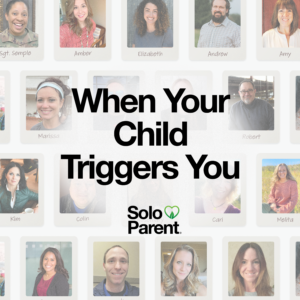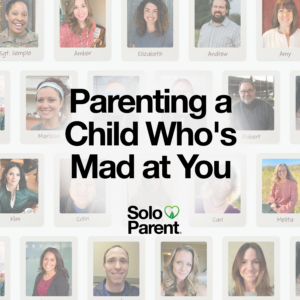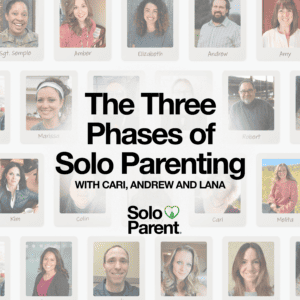Regret as a single parent runs deep. It can be in the day-to-day interactions with our kids, that thing we didn’t say to our former spouse and wish we had, the choices we’ve made with our lives that got us to where we are. But can all of these regrets actually serve us moving forward? And how can we use regret to our advantage and actually have a better life because of them?
Today we’re going to talk about this and cover it in three main points. Number one, we’re going to talk about the misconceptions of regret. Number two, we’re going to talk about the four core regrets. And finally, we’re going to talk about using regret to grow and shape our future.
Let’s discuss the misconceptions of regret.
Regret is always a negative and always equal failure. We may tend to think that we have to avoid regret, we have to do everything so we don’t regret anything. But just because we have a regret doesn’t mean that we failed or doesn’t mean that we should have done something different.
I think another misconception that we have is that regret is only tied to major decisions or wrong choices. I think we can often think that it’s just associated with the bad decisions and the mistakes that we’ve made, and it’s not, that is a misconception.
And I’d also say that there’s a misconception that it’s universal and that it’s unresolvable. And what I mean by that is [the viewpoint that] everyone experiences regret the same way and that it can’t be solved. It’s not a thing—we all experience regret differently. The way I experience regret may be stronger or I may have bigger feelings than what you have. It’s not universal. Everybody’s is different.
Another misconception is that regret has no value or is a sign of weakness. So I have to feel no regrets because otherwise people will think I’m weak. I’ll think I’m weak. And when I think about regret, at least in the way that a lot of people frame it or no regrets, is that it’s somehow tied to weakness or something that’s defective. And so we don’t want to go there. We’re fearful of it. And so yeah, I think that’s a major misconception.
What are the four core regrets?
Okay, well this is all based on Daniel Pink’s book called “The Power of Regret,” which is a super fascinating idea. But his research is based on 26,000 regrets from people in 134 countries. And what he did was he compiled this into four different regrets and looked at what we as humans regret and how do we look at it? And so here, I’m just going to go through them pretty quickly. Foundation regrets is the first one. And that’s something like if I had only done the work, and so examples of this are like, maybe I didn’t save enough money or I neglected education or career planning, or failed to maintain physical health and wellness. Over time it creates a sense of instability and insecurity and dissatisfaction in the present. It’s also linked to long-term planning and consequences of an action. I actually felt a little seen with this one. I’m like, man, I really need to start budgeting.
Number two is boldness regrets. And what that sounds like is If I had only taken the chance and regrets about missed opportunities due to fear or hesitation or a lack of confidence. The examples are: maybe not pursuing a dream career or starting a business, or maybe you avoided expressing feelings to a loved one, or you failed to take a life-changing trip or experience or something. And so what this does is lead to feelings of stagnation and what ifs, a lack of fulfillment. It’s often tied to personal growth, adventure. And for me, this one sticks out as a single dad. There was addiction that ran in our family and it was prevalent in our marriage. And I often have this regret of I should have been more bold. Would I have been able to turn things around if I would’ve just really confronted her? Or if I would’ve been the one to leave to send a message that this isn’t going to work out? I think a lot of single parents that look through something that didn’t work out [wonder], What if I would’ve done this? What if I would’ve shown more affection?
And then number three is moral regrets. And that sounds like If I had only done the right thing. It’s regrets about actions or inactions that violate personal values or ethical standards. And some examples of this, of course, are cheating or lying, failing to stand up for someone, engaging in harmful behaviors or relationships. And of course this causes guilt and shame and diminished sense of integrity. It’s often linked to relationships and social interactions. So
And then the fourth one, which I thought was really interesting, was connection regrets. And this one sounds like If only I had reached out. This is regrets about missed opportunities to maintain or repair relationships. So examples can include losing touch with a close friend or not reconciling with a family member or letting relationships drift due to neglect or misunderstanding. And of course, this creates feelings of loneliness and isolation and longing. It often stems from either failure to act or the belief that it’s “too late.” I think this is a big one for the widows and widowers, and I have regrets of missed opportunities that even my children had with their dad. I just wish for one more opportunity to see him. Or I could probably put a regret in every single one of the other categories that actually comes back to regretting that I can’t make that connection one more time.
How do we use regret? How do we actually embrace regret to grow and shape our future?
In [a previous episode], I talked about not answering the phone on a couple occasions. That’s actually something that I regret. I regret that my son was literally embarrassed sitting in an ambulance and coming to find out he has a heart condition. I had no idea and I wasn’t there for him. So for me, I can dwell on that and guys, I could go deep and I can get stuck in a place where I don’t want to be because now I’m feeling sorry for my child and I’m catastrophizing and all these horrible things are happening. And then I look up across the room and he’s over there laughing and having a great time. I’m like, “Whoa, okay. I let my mind wander a little bit too deep on that.” Instead I can use it to say, “Okay, I really am going to answer the phone every single time that he calls me. I’m going to make sure that he’s okay. I’m going to have connection points with him and check in with him. So I can use it to be constructive.
There’s four categories of regret, each one of them have kind of a different flavor, how do you navigate each one of them? Because with some of my regrets, it can be hard to say, “Oh, here’s a positive or silver lining that I can find in that.”
One of the quotes that Daniel Pink has is that he says that regret can be used as a tool to bring clarity to what matters most in your life, which I thought was a really interesting spin on it. And of course, the values that you stand for. So if you’re looking back and you notice the regret, it’s like, “Oh, okay, this matters to me.” It’s not something that you have to kick yourself for. You can say, “No, this matters.” He gave some practical steps. If you look at the [regrets] that are coming up for you, there are actually practical steps you can take to address each one. So if you want to look at all four, great. But if you’re like, “Man, this one really stands out, maybe write this down.”
So with the foundation regrets, he says to start building stability now. Go ahead and start saving, investing in your health or investing in your wealth or learning and doing something that will help move you towards having that solid foundation that you are regretting up to this point with boldness. You can take small calculated risks and embrace discomfort. I really love that you don’t have to jump too far. You know what I mean? You can just go to the next step, even though it’s little, just a little bit at a time, a little bit of discomfort at a time and even test the waters. I think about this with starting my business, I didn’t jump right out and do it right away. I tested the waters while I was still working full time. I picked up a client or two just to get an idea of, “What does this look like? What does success look like to people on the outside of where I worked? Do I have time? Do I even care to do this? Do I like doing this? Do I like working with other people?” I wanted to test the waters before I took the full leap into entrepreneurship.
And then the third one, moral regrets. It seems pretty simple—apologize, make amends, and align future actions with values. We can’t change the past, we can’t change what we’ve done to hurt other people, but we can go in humility and say, “Hey, I’m really sorry,” and then don’t do it again.
And then with connection regrets, reach out to other people and repair relationships even if it feels awkward. So I don’t know Marissa, how that hits for you, but there’s nothing that you can do about those regrets. So what would you say, from a widow’s perspective of that connection, regrets, how do you do that? I think part of that is putting focus on the people that I do have and making sure that I’m giving time and getting time while I have it with my kids and my friends and my parents and everybody else in my life because I can lose all of them. And so I can take that loss and learn from it and just move forward in other relationships.
I think that’s why this topic of the unnecessary things being no regrets is reframing what regret actually is. And it makes me think a couple of things. First of all, one of our favorite guests Chip Dodd talks about feelings and the impairment and the benefit or gift of them. And to me, if you embrace regret and see it for what it is, it can be empowering and it can actually transform your life. We talk about this a lot at Solo Parent—sometimes it is those difficult things, those wrong choices, those missteps. I have a lot of regret about the foundation I laid for my previous marriage that is informing how I’m building my current marriage. And it made me think, Marissa, you now take every call from your kids, and I love that. And that is because you had a regret. It’s because you experienced that, that you changed that, even if it’s a small little change. And in the sense of relationships, I think I’ve said this before, sometimes it’s more important to do repair than getting it right every time. It’s great and that’s cool, but it’s impossible for us to do that all the time. And if we embrace regret, if we embrace the fact that we are not perfect and we’re not going to get it right and we make a repair, it can actually be more powerful and more rich because we did embrace regret. We did understand and accept the fact that we have something to repair. It’s not a burden. We don’t need to run from it. We don’t need to be afraid of it. We all have it. And I think it’s helpful to identify what those are, whether it’s the foundational boldness, moral, I think we can identify something in each one of those categories. Regret can be a teacher.
Takeaways
- We have a tendency to believe that regret is bad and we buy into the no regrets mentality, which can actually really hurt us.
- According to this great study, there are four universal core regrets that we can tap into to make better decisions.
- With some practical actions, we can understand the patterns of our choices and start making better decisions and build a better life for ourselves because we have regret.
Listener Question: How can I teach my kids good money habits when finances are tight?
So the role that I’m in right now where I work, I’m answering this question, but for COOs and CEOs. So the question doesn’t change because finances are always tight—when you have more, there’s more things you want to do with it. So this is a really important behavior to learn. I have a finite amount of resources. What can I do with those finite amount of resources? And so to me, it comes down to choices. And that’s one of the things I’ve tried to teach my kids. So for example, if we’re going back to school shopping, we go to their room and I say, “Okay, what do we need? You need two more pairs of shorts. You need one more pair of pants. That’s what you’ve outgrown. You have no shirts that don’t look like you’re wearing some toddlers clothing, so you probably need all new shirts.” And then I will give them an amount: “Okay, you can buy three pairs of shorts, but here’s an amount.” And sometimes they’ll come to me and say, “But I really, really love this shirt.” “Well, can you find something else that’s a little bit cheaper?” So it’s about those choices and letting them know that they’re making those choices because sometimes we spend money and don’t realize that we’re choosing between that and something we want to buy tomorrow.
As my kids got older and had driver’s licenses and a car and they were out, I’ve made my children submit expense reports to me. I told them the rules, and this is because I’ve worked in an expense reporting department. I told them, “This is what I’ll reimburse if you submit it on Excel.” My motivation there was because Excel is such an important tool and I wanted my children to be exposed to it. So I was like, “Yeah, if money’s on the other side of it, they’ll figure out how to use it.” And then every so often, every six weeks, sometimes three months, they’ll go through what they’ve spent and put it together. So they’re actually having to see, “Oh, I spent all of this money.” And then they’ll say, “This is what I have to pay for” or “This is what mom will reimburse.” So even my college kid now, I’ve told him, “I’m going to continue paying for your health insurance. I’m going to continue paying for your medical bills.” I don’t want him making choices between medication and eating. I just want him to not have that worry right now. And fortunately, I’m in a place where I can do that, but all of it comes down to choices.




